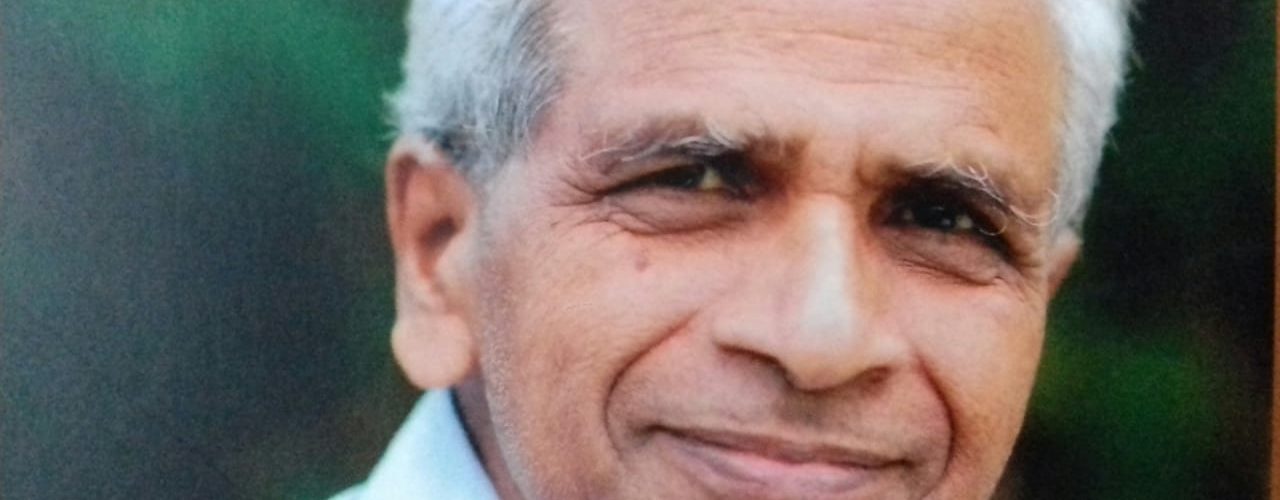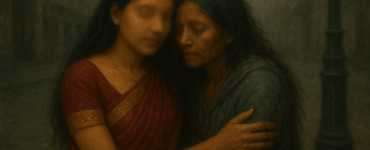Telugu original: Sripathi
Sripathi (1938- ) belongs to the “New Wave” Telugu writers. A prolific writer, he has several short story collections to his credit. Significant among them are Manchu Pallaki Mari Thommidi Sripathi Kathalu and Nemalla Adavi. His works reflect deep compassion and sensitivity to the human condition. His narrative explores the relationship between human beings and nature in all its manifestations.
*
It was upsetting to look at Saku akka. Pain and repentance at not having seen her all these years. Going to this village was like a journey to a desert. The bus would drop us some ten miles away from the village. A walk from there on. Or else, a bullock cart. If I did not go there now, I would only go back to that Andhra country after about two years! I could not even write a letter before I set out.
Akka’s face bereft of kumkum on her forehead flashed many times before my eyes. I had not liked the village from the first time I set my eyes on the dilapidated bungalow in the agraharam that abetted the sea. Peepal saplings sprouting from the cracked walls; the sight of grass growing on the moss-ridden tiled roof; the stench of bats in the inner rooms; darkness; wide-spread spider’s webs spotted on opening the windows; holes made by bandicoots; mud dug out by ants—a helpless indignation had filled my heart at my sister stepping into such a household as a daughter-in-law.
Now…
Pitiably…
As if she was putting up with many insults…
Could not recognise her. Saku akka’s present appearance…
Goddess-like akka. Now a sick person…
Subhash, who was studying in the first class in the village school, came fifteen minutes after I did. He looked suspiciously at me when I said, “I’m your uncle…your younger uncle…” When I drew him close, he cried and slipped away from me.
At first, Saku akka enquired about father’s health. He was using Homeo medicines. I said his health was better. She asked after mother. I said she was well. Though I remembered mother’s pain, I swallowed it thinking of Saku akka’s distress. She asked after our elder brother. The recent promotion, an extra floor to the house, thinking of getting Renu married, Subha’s stubborn determination to study and not get married—such conversation went on for a long time. It was surprising that akka remembered Subha’s and Venkateswarlu’s names and enquired after them. Akka had not seen either Syamala or the children. We could not come here after marriage. Something or the other had come in the way. Saku akka had taken ill during the time of our marriage. Could not come for the marriage. When she listened eagerly about the children’s education in Delhi schools—I recalled once again the way Subhash had returned from school. The conversation about Delhi was going on. Looking into nothingness, unable to control her sorrow, she shed copious tears, covered her face with her hands and sobbed out loud.
On hearing her cry, uncle came into the room. Aunt and other people in the house came into the room as if something catastrophic had happened. They swarmed around her. I was looking on from outside the room. Anguished, she could not control her tears. That crying was strange. The whispers of the women who had gathered there also appeared surprising. They took akka to the next room.
Wonder what good these relationships that had formed in the social set-up achieved! Her husband died in her youth. A second marriage was not allowed. Prohibitions. A young son. Regulations. Insults. Helplessness at not being able to live alone. Family prestige. Caste codes. Morality, duty and responsibility—all kinds of bonds. A sad plight of not being able to revolt against them or to escape from them
What I understood was that these people were not even allowing akka to cry enough to unburden her heart.
Uncle who had welcomed me happily a moment ago was looking daggers at me. Unable to sit witnessing that scene, he went out into the street.
How much the country had changed in these ten years! Ours is Vijayanagaram. Soon after Andhra state had been formed after separating from Madras, my elder brother had got a job in the Secretariat. Kurnool, then Hyderabad. As his health had not been good, mother, father and akka went to Hyderabad. The next year, they had taken me and my maternal grandmother. It had just been then that akka got married. Brother-in-law was very well educated. From Srikakulam district. Wealth amounting to hundred and fifty acres. Beneficiaries of the agraharam. Their houses used to be like zamindars’ houses.
If Saku akka had such an alliance—everyone had been ecstatic at her luck—Saku akka’s beauty was such! Added to it, akka’s music. Her singing. To match their status we had to sell the ten acres of land we owned in the village in those lean times. As there was only one girl in the family, father, mother and brother had been determined that there ought to be no shortfall and had performed the marriage grandly.
Three to four years after the marriage, the situation had turned topsy-turvy. The lands they had won in the Inamdari litigations in the lower courts, the farmers won them in the higher courts. New laws abolishing Zamindari had been passed. Though I came to know that they, who had lived well earlier, were hit badly economically, I could not imagine that they had fallen to such a miserable state that they could not even white wash the house. I did not know that Saku akka was putting up with such a miserable life.
With my tender eyes, I had seen this house resplendent with green leaved marriage pandal. With festoons of mango leaves, marriage pandal made of coconut fronds, banana plants, the marriage mandap had looked so beautiful!
After brother’s employment, as father too had joined a Telugu newspaper, we were well settled in Hyderabad. Around that time, because of lack of proper medical aid, with the illness becoming serious and due to negligence, brother-in-law passed away. Akka was living in those caves for the sake of her son who was the heir, for the old fashioned house that was left behind and for the thirty acres of land that remained. Five years ago, when brother-in-law had passed away, mother, father and brother had come to see her. It appeared as if they had not understood this pain. Paternal uncle who lived in Vijayanagaram would keep writing letters. But he had never even hinted at their pitiable life. For some, these do not appear as troubles. Life is sun and shade. They would think in that manner, but would not look toward a new life. Such a thought would not arise. “What does she lack—she has a son. They have a fort-like house in the village. They still have thirty acres of land. She must live looking at her son. Mother-in-law and father-in-law are good people. They are looking after her like their own daughter.”
I felt that I should not let akka stay there even for a moment. I could not sleep all night. I ought to take akka with me to Hyderabad. I ought to tell them about father’s illness, convince them and take akka and Subhash with me. I was thinking of a strategy. If she remained like this here, akka would most certainly die in two or three years. That started to terrify me. Perhaps she would not live for even two or three years. I ought to rescue akka. Akka was the only girl child, daughter, sister…the woman-figure to all of us. Akka’s face ought to bloom. Laughter ought to pour out of those lips. Songs ought to flow out of that throat again. How great akka was! If she had been in Delhi, she would have reigned as a great singer. Whenever I used to watch cultural programmes in Delhi, Saku akka would come to mind.
* * *
It was Sambam’s job to bring the daily newspaper which would come to the library from the branch post office. The post bag would arrive at that village at eleven o’clock. Sambam would love to look at the pictures of film stars. It seemed as if Sambam had some hereditary skin disorder. The skin appeared as if it had dried up. Thin string-like cracks on his face and all over his body as if he had smeared ash. As his neck was short, his head fell on his shoulders. Though he was of average height, he had an insignificant body
Brother-in-law had set up the panchayat library in the verandah of his house. It would normally be open. I had come to know Sambam when he came to return Kasi Majili Kathalu that he had borrowed from the library. It seemed that he was trying to find employment as a primary school teacher. When I advised him to take care of his health, he said he had no money to buy medicines. He said, “If I find employment, I’ll buy medicines, babugaru.” When I heard Sambam’s reply, I understood how poor he was.
I noticed that uncle was boasting about things that were true or otherwise about me to whoever he met in the village, whether they had asked him or not—that I was Sakuntalamma’s brother, that I had a big position in Delhi etc. There was just one truth in all that he said. That I was working in Delhi. Just the status of a central government officer. To date, he even boasted about the greatness of his ancestors saying that in the bygone days of the British rule, the white doras would come and dine at their house, and that they would stay in their mansion and go hunting. That morning, when the revenue inspector came to the village—whenever anyone in authority came to the village, they would come to uncle’s house. Their older modes of respect and of pleasing those in power went on unhindered—evident when I heard the deference and respect in the revenue inspector’s voice. I felt that the house continued to be strong enough to keep up the age-old greatness!
“Kasu Brahmananda Reddy is the Chief Minister of our country. President, Kamaraj Nadar. The main language of our country is Telugu. Unless the English come again and rule us, our problems will not be solved”—this was the extent of Sambam’s education. I told Sambam that some other job might be better than a teacher’s. Even twenty years after Independence, independence had not stepped into this village. I felt that the village had deteriorated since I had seen it twelve years ago, but had not got better. Caste system still continued. Untouchability was still prevalent. There was not even a new road laid out in the village. Only the old cart tracks. Only mud roads that passed through lake bunds, through fields and across tiny canals.
That evening when I went to look at the sea, Sambam kept me company. Saku akka was extremely fond of the sea. When we used to visit our aunt in Vizag, we would play in the Maharanipeta beach. I still remember clearly akka telling me after the bride-viewing ritual, “It seems the sea is very close to their village. It seems we can hear the roar of the sea at night, tammudu.” It was pitch dark at night when we had gone the first time to her in-laws’ place. I could still recall her nudging me, who was swaying in my sleep, saying, “Tammudu, listen to the roar of the sea—have you heard it?” in the din of the bells of twenty-five to thirty bullock carts. When she had come for the first time with brother-in-law for the Sankranti festival, she said, “I went six times to the sea. Your brother-in-law took me five times. I went once with the people in the village to bathe at the time of the solar eclipse…” For Saku akka the sea was a great attraction.
The waves, roaring and gushing forth, were wetting the knees and receding. Sea birds and water crows were flying over the sea shore and were picking up insects. The sea was the blue that stretched east till the horizon. The blue of the sea glittered like gems in the evening sun. Beauty of the waves dancing and singing on the shore mesmerized the heart. As far as the eyes could reach, sand that stretched endlessly to the north and south across many miles shone in many hues… In between the sand dunes, water holes. Around the water holes, mogali groves. Many miles of mogali bushes. Behind them, on some thousands of acres, as part of five-year plans, were casuarina groves. In those groves, here and there fishermen’s villages. At those villages, boats near the sea shore. In the beauty of the isolated sea shore, the heart remained silent for quite a while. One could sit and view that great beauty for any length of time. Perhaps we had walked along the shore for a long time, I stopped to sit down.
“Not here. Let’s go there, babugaru,” said Sambam.
It seemed that a girl of Sambam’s caste had been infatuated with a Muslim boy who would go about villages and sell fish, became pregnant, jumped into the sea and died. They had buried her dead body right at the place I had wanted to sit down.
I felt that a beautiful youth had turned into sand underneath my feet. Feeling that I was stamping on flowers, I stepped aside. I stood for a while just staring at the sand. In this infinite flow of time, I felt as if each grain of sand was telling its own story.
Walking a little distance away, we sat on dry sand close enough for the sea waves to touch us.
Sambam narrated his story. It seems his mother and father passed away in his childhood. He grew up under his maternal uncle’s care. I firmly believed that those who lose their parents in their childhood turn out to be cowards. Otherwise, they become cruel. This was one of the reasons for Sambam’s timid voice. It seems his father had a property of four acres of dry land. They would have to sell it to settle the debt from the money lender. The money lender seemed to be pressurising him either to settle the debt or else to transfer the land in his name! He was making sure that no one came forward to buy the land to get the right price.
It appeared as if the abolition of zamindari and the right of the land to the tiller would be like this! Close by, in the casuarina grove was the village. On the other side, a youth in pants and shirt was visible. Noticing him, Sambam stood up, clapped his hands and shouted out to him. “He’s the fish inspector, babugaru. A very big man,” Sambam said.
“He lived in the room next to the panchayat board, in your uncle’s house in our village. It’s six to seven months since he went to the neighbouring village. He’s of your caste.” Saying this, looking in the direction from which he was coming, Sambam said, “Name, Sudhakararao. He’ll give his life for music,” he said.
Sudhakararao came with a tall, thin swagger-like walk towards them.
“Fond of dramas and films. For those, he’d go to Isakhapatnam, Seekakulam and Barampuram on this side—sometimes, I too go with inspector babugaru.”
“What’s happened to you, Samba? When I went to your village for you, they said you had come here. Why have you surfaced here leaving the casuarina grove?” Saying this, Sudhakararao looked at me with questioning looks. He appeared as if he was five or six years older than me. He had sprightly eyes like an artist. A white shirt, light blue pants…
“Subhashbabu’s maternal uncle.”
“Sakuntalammagaru’s…”
“Younger brother,” I said.
“Presidentgaru has talked about you a lot.”
In his looks, I saw my close friends. A voice that recognized the goodness of others, a pure heart. Looks that did not belie strangeness.
Sudhakararao sat near Sambam, in front of me.
“That you sing well…”
A tiny smile spread out on his lips.
A happiness that is caused when others appreciate our artistic talent. The curly hair, dishevelled due to the wind, appeared strange. Looks that suggested contentment in life.
Felt like stretching out on the sand.
He sang, “Aakashaveedhilo” (In the streets of the sky). He sang, “Kondagali thirigindi” (the mountain breeze wafted).
How wonderfully akka could make the violin voice these songs…
He sang, “Chukkalannee kondameeda… Eluthuranthaa mesi yeru nemaresindi… (All the stars on the sky…the stream ate and chewed up the entire light!)
The dusky sky decorated the cool colours.
He sang,
“Idey Penna (This is the Penna) …”
“Maatlaadani Malle Mogga (The silent jasmine bud) …”
There music turned into romance. Romance turned into youth. Youth turned into fragrance. It spread all across the sea, becoming the turbulence of the souls, flowed into the depths of the hearts.
I turned to a side and looked at the sea.
The fingers of the wind were dancing on the thousand crore stringed veena.
Sambam was searching for someone in the distant casuarina grove. I looked at Sudhakararao. He was looking into nothingness. Was perhaps older than me. With the culture of youth, with calmness, his appearance was sprightly. The clothes he wore were unostentatious. His looks were calm and dreamy. His face was glowing as if white lotuses were filled with sacrifice.
It became dark. We went homewards. The path was through the casuarina grove.
“You keep walking.” Saying this, Sambam took a turn.
After walking a little ahead, Sudhakararao said, “Love.”
It seems, Sambam’s beloved was waiting for him. A friend who knew all their love signs.
“He’s getting married to that girl in the month of Magham,” he said
“Poor guy, he lost his father in childhood. His maternal uncle brought him up. He’s the one who’s performing the marriage.”
I felt as if Sudhakararao had made a mistake. Sambam had just said that both his mother and father had died during his childhood.
“His mother too has passed away, right?”
“In their caste, re-marriage is allowed. A few days after her husband died, she married again. Sambam feels ashamed about admitting his mother’s re-marriage. He too lied in the same manner to me.” He says this unasked.
“Yes.”
I could not forgive Sambam who had spoken of his mother in that manner.
Sudhakararao came home along with me.
* * *
If in the north-east verandah of that house was the library, in the south-east veranadah was the panchayat office. The library remained a symbol of my brother-in-law’s culture. On the walls of the room were the pictures of Kandukuri Veeresalingam Pantulu, Gurazada Apparao Pantulu and Mahatma Gandhi. That was enough to indicate his taste… In the library Vavilla’s Ramayanam and Mahabharatam, and other works…very large rosewood almirahs…
The south-east room was uncle’s status symbol…
Old fashioned sculpted chair—no matter how venerable the guest was…he could not sit on that chair. There were other old fashioned chairs for them. They would only bring them out and put them there…
The verandah with round stone pillars was very large. The panchayat office in that verandah. Towards the room, uncle was seated on the sculpted chair. On the floor, a grey haired man was sitting leaning against a stone pillar. On his forehead, a vertical kumkum bottu. Hair hanging on his back, gold studs on his ears, twirled moustaches. In that attire, he appeared like a witch doctor. Two silver tumblers—they were indicative of the tea they had just had.
The whole bungalow was south-facing. In that village, that bungalow appeared like the stump of a tree among brambles.
The pendulum of the roman-numeral wall clock struck nine.
When we were outside, uncle had fondly taken Sudhakararao close and made him sit near him. It appeared as if he was habituated to sitting on the floor. As uncle was talking to him, I went in.
Looking at my clothes, akka seemed to have understood. Even so—
“Where did you go?” she asked.
“To bathe in the sea. We thought of it yesterday. Sudhakararao and Sambam—they took me.”
Listening to me, she was lost in thought. Sorrow seemed to have engulfed akka. Crying as if the dam had breached.
The salt water of the sea on the body was irritating. Wanted to go to the back yard and have a bath at the well. There were bathrooms near the well. That was a separate two-roomed tiled house. One was the men’s bathroom. There were huge brass cauldrons in that room. Mud pots. In the morning, the servants would draw water and fill them up. But now, the doors of those rooms were swaying such that they might fall off.
By the time I had a bath and came back leisurely, a scene of the people in the house swarming around her in the middle of the room was visible.
That witch doctor, holding akka’s head with one hand and holding a strand of hair right at the centre of her head with another, was looking sharply into her eyes and asking furiously, “Who are you? What’s your name?” Saku akka had stopped crying and was looking at him wide-eyed. That witch doctor was repeatedly asking the same questions in a loud voice.
It seems a Sudra girl was enamoured by a Muslim boy who sold fish, became pregnant and died jumping into the sea. That girl had turned into a ghost, had possessed akka and was crying out, “Sea, sea.” The first time the ghost possessed akka, she seemed to have held a knife, run to the yard and chopped off flower plants. She had plucked out the smaller plants with her hand. She had broken all the flower pots, without leaving even one in tact. I realized that noticing akka cry from the previous day, uncle suspected something and sent for the witch doctor.
That witch doctor gritted his teeth and said, “Who are you, tell me, tell me?” tightening the strand of hair that he had entwined round his index finger. Though akka was writhing in pain because of it, she did not say a word. She looked towards me. She looked down. Not speaking, crying, looking wide-eyed—these were supposed to be the traits of the ghost. A stubborn ghost.
“Here, first let go of the hair,” I shouted.
That witch doctor did not pay any heed.
Hearing my voice, scared, uncle escaped.
Pushing aside the group of people surrounding her, shouting, “Leave it,” I pushed him out. He fell on to the ground. When a couple of people tried to stop me, I shoved them away. I felt so angry that I wanted to kick them there. All of them went away from there.
Hearing the commotion, Sudhakararao came in.
Saku akka sat crazily on the cot. Tears started rolling profusely from her eyes.
I sat next to akka. She gazed into my eyes for a long time.
“They’re killing me like this,” she said.
Again tears. Again sobbing uncontrollably. Sorrow within.
“Don’t cry, akka.” Though I was saying this, I felt it would be better for akka to cry. I knew that the need now was for akka to cry freely so that all the sorrow in her heart would surge and flow out. Even so, the words, “Don’t cry, akka,” kept coming out.
* * *
It was Sudhakararao who arranged a vehicle for our journey. He escorted us. They hid Subhash so we could not find him. In the end there was a lot of commotion. A huge fight…we could not take the boy along with us. The fear that Saku akka’s life was at stake gripped me.
Akka was crying for Subhash. A mother’s heart. True, but the initial danger was to her life. Sudhakararao, who was trying to console her along with me, suddenly stopped speaking. “Why aren’t you saying anything?” Saying this, as I was about to turn my face, I felt my hand wet with his tears.
“Why are you crying? Why are you crying?” I asked.
“I had been witness to this torture the last two years. But I could not save her. I’m an outsider. If I open my mouth, people would suspect me. You were able to save her. You were able to oppose them fearlessly, abuse them, terrorise them, and rescue her from that torture. To be a younger brother, to be an older brother, to be sisters…to be a wife and child, all bonds are but ones of authority, right?”
Were Sudhakararao’s tears just for that?
“Unable to do anything, living in the next room—unable to bear the torture she was undergoing everyday, I ran away to the neighbouring village.”
Saku akka in her own sorrow.
The chiming of bells of the bullocks. The sound of the wheels of the cart on the gravel. The regular rhythm of the steps of the bulls. The creaking sound of the cart’s axle. The roar of the sea. The cool breeze.
Akka seemed oblivious to Sudhakararao’s voice. She was crying copiously in a weak voice. When asked if she did not wish to go along with me, she would not respond.
First akka’s health ought to improve. Later, whatever she wished.
True, motherly love was important, but akka’s health. What was most important for akka was that she ought to get away from her problems. Love and responsibility, only if akka were alive. Akka had expressed through her tears that she did not want to live in those stifling dark caves. Perhaps she could not express herself through words. Father-in-law wanted Suhash, the heir. But daughter-in-law…. But I wanted my akka.
“I’ll ensure that within a week your father-in-law himself will bring your son to you. Don’t cry. Everything that’s happening is for your own good.” Sudhakararao’s words of consolation could not dry akka’s tears.
At dawn—as the morning rays of the eastern sky were opening out our bullock cart reached the junction. Sudhakararao, who we thought would come with us to the railway station and bid us goodbye, put us on the bus and bid us goodbye with a smile, saying, “Till we meet again, bye.” As the bus sped on, Sudhakararao’s figure became smaller and smaller till it merged with the colour of the ground and the colour of the sky there.
(Translation of “Kumkuma” from Manchu Pallaki Mari Thommidi Sripathi Kathalu. Hyderabad: Lekha Prachuranalu, 2005, 114-126, by Alladi Uma and M. Sridhar. First published in 1967 in Andhra Sachitra Varapatrika.)
*









Add comment